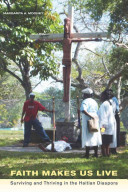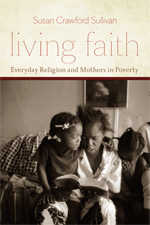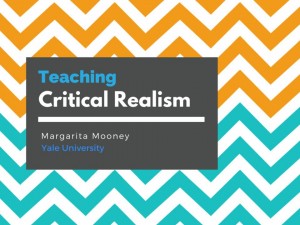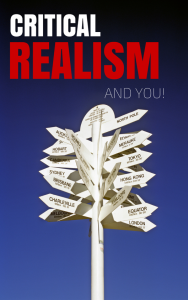Yesterday I sat down in my favorite spot at home and surrounded myself with books and articles and began to draft a new article on personalism and sociology, a topic I have already written about on BW&G. Why do I care about personalism? Every once in a while, it’s good to step back and reflect on our theoretical understanding of key concepts or objects of study. If we don’t, we are prone to making errors in our explanations.
 An interview I conducted about halfway through my fieldwork for my book on Haitian immigrants, Faith Makes Us Live: Surviving and Thriving in the Haitian Diaspora, illustrates one such error I made about persons. Sitting in the suburbs of Montreal one afternoon, I interviewed Lucien Smarth, a Haitian priest who also had advanced degrees in sociology and anthropology. How would you reply to the Marxian critique that religion is the opiate of the masses, meaning that people flee to religion to alleviate their real suffering, which for Marx, was material deprivation, I asked him?
An interview I conducted about halfway through my fieldwork for my book on Haitian immigrants, Faith Makes Us Live: Surviving and Thriving in the Haitian Diaspora, illustrates one such error I made about persons. Sitting in the suburbs of Montreal one afternoon, I interviewed Lucien Smarth, a Haitian priest who also had advanced degrees in sociology and anthropology. How would you reply to the Marxian critique that religion is the opiate of the masses, meaning that people flee to religion to alleviate their real suffering, which for Marx, was material deprivation, I asked him?
Smarth stated forcefully that although intellectuals separate out material things from spiritual things, for Haitians they are all related. As I quoted him in my book:
“For me, that’s what religion is in general. We feel our limits, we feel our weaknesses, we feel our inability to change things. And then we call on another force, a divine force, to give us more strength and greater capabilities. I find it completely legitimate that people turn towards religion to solve their problems. Because that’s what I take to be the meaning of religion. It’s the same here in Montreal as in Haiti: Haitians feel the same powerlessness in so many respects, and that is what makes them turn towards God…I also think that religion aims to make the earth become more and more, better and better, an image of heaven. So they [believers] have the task to make life down here more beautiful, so earth becomes more like the image of the beautiful life they await on the other side” (Faith Makes Us Live, p. 133).
One key idea of personalism is simple that the person is a whole. As Smarth pointed out to me, intellectuals tend to analyze separately the mind, body, and spirit, but he cautioned that such analytical abstractions do not correspond to how most people experience themselves in the world. People who pray a lot aren’t fleeing the world; the spiritual and material exist on a continuum rather than in separate spheres which don’t cross.
Similarly, yesterday I read an excellent article by Eugene deRobertis and John Iuculano entitled “Metaphysics and Psychology: A Problem of the Personal,” in which they argue that behaviorism in psychology saw the mind as epiphenomenal–or a product of the material world–and much of today’s cognitive science sees the brain as computational. Both of those viewpoints portray a rather mechanistic view of humans that leaves little room for persons as centers of meaning who act with purpose and responsibility. This mechanistic view of the person may tell us what a person does or even how she does it, but can tell us precious little about why a person does something.
To give another example, when I traveled to Port-de-Paix, Haiti, I met with a group of 15 people who participated in a rotating credit fund. Each month, each group member contributed $10 and the total amount went to one person to fund a small business venture. Such rotating credit groups rely on enforceable trust to ensure the money gets paid back. After 30 minutes of me asking questions about about how many members they had, how much money they collected, and how successful the small business ventures were, a Haitian seminarian sitting next to me said in English, “Why don’t you ask them what it means to them to be in this group?” I translated his question literally into Haitian Creole, not having any clue why I was asking that question or what they would say.
Suddenly the faces around the group lit up. “Oh, God is good!” shouted one lady in her 70s. “He always takes care of me!” Another added, “I know that if God helps me I can help others–I go out now and help my sick neighbors.” A third said, “I know now that I can help myself–I take better care of my house.” In other words, my fallacy was to analytically focus on the material benefits of the rotating credit group without even considering what their participation in this group meant to them.
As I have written before on BW&G, the person knows himself or herself as a relational being, a being distinct from yet profoundly shapes by other persons, and the person sees himself as shaped by the material environment and by unseen realities (like God). A person knows himself or herself not just as an abstract subjective being but as a person who acts; these actions may indeed be influenced by other persons, the environment, the supernatural, but the person acts. What is the meaning, the purpose of this life? One important meaning is to sustain relations with others, to act responsibly towards others.
As DeRobertis and Iuculcano write, “We will argue that the most basic level of human experience is the lived-experience of the self in its transcendent relatedness. It is a dynamic self-in-action within the world of day-to-day affairs. It is a unified structure because the self is co-constituted in-the-world-with-others, rather than a dualistic or otherwise fragmented self. The ultimate meaning of this co-constituted existence springs forth from the person’s responsibility laden relations. Hence, the most well-integrated (or least fragmented) level of human experience is the lived-experience of the self-in-responsible-relation-to-others or simply, the person” (Metaphysics and Psychology: A Problem of the Personal, p. 115).
Is there a value-free kind of behavior? DeRobertis and Iuculcano think not. Behavior entails responsibility. Even conditioned behavior doesn’t free the person from responsibility; if it did, that would be dehumanized behavior. DeRobertis and Iuculcano caution that such dehumanized behavior should not be our theoretical model of the person, as it doesn’t correspond well to most people’s experience of reality. When behavior is seen as dehumanized, people express angst and dissatisfaction. As they state, “The real-life experience of living-out actions without a sense of agency, value, or responsibility more closely resembles a pathological mode of existence than an accurate description of human reality” (Metaphysics and Psychology: A Problem of the Personal, p. 114).
 What I learned working with Haitians resembles what Susan Crawford Sullivan learned in her work among extremely poor single mothers living on government assistance: even the poorest people who you might think of as being most influenced by their environment experience themselves as responsible actors actors in the world. Sullivan’s book, “Living Faith: Everyday Religion and Mothers in Poverty,” portrays how extremely poor mothers expressed personal responsibility for their own failings while also acknowledging how other persons and institutions had failed them. Perhaps to deny their own responsibility for their failings would be to deny their freedom, which is central to their self-understanding. If people do not feel responsible for their own actions, where would their hope for a better future come from? If our lives were just products of the environment we are raised in, why wouldn’t we just give up the struggle?
What I learned working with Haitians resembles what Susan Crawford Sullivan learned in her work among extremely poor single mothers living on government assistance: even the poorest people who you might think of as being most influenced by their environment experience themselves as responsible actors actors in the world. Sullivan’s book, “Living Faith: Everyday Religion and Mothers in Poverty,” portrays how extremely poor mothers expressed personal responsibility for their own failings while also acknowledging how other persons and institutions had failed them. Perhaps to deny their own responsibility for their failings would be to deny their freedom, which is central to their self-understanding. If people do not feel responsible for their own actions, where would their hope for a better future come from? If our lives were just products of the environment we are raised in, why wouldn’t we just give up the struggle?
In my view, sociology does a better job of describing dehumanization than in describing reactions to it, reactions such as resilience, hope, struggle. Why? Perhaps as intellectuals we feel convicted by others’ sense of responsibility for their situation in the world. Perhaps we are utilitarians who want a world with all the good but none of the bad. Perhaps we are utopian Marxists who think that if we can re-order social structures and material wealth, then humanity will flourish.
Material wellbeing may indeed be one element of flourishing, but we have to get away from the tendency to reduce the human good ultimately to one thing. One kind of human good I am particularly interested in is relationships, and my reading on personalism has led me to see that relationships always entail responsibility and obligation to the other with whom we relate subjectively and objectively. In future posts, I hope to explore further how personal responsibility and obligations to others form part of human flourishing.











